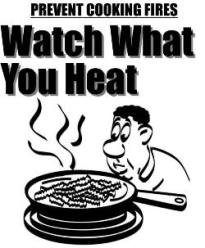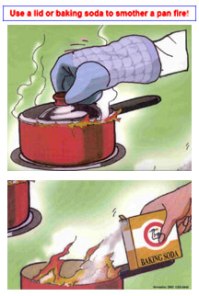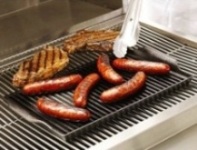
Cooking in the Kitchen
The preparation of the home cooked meal is the leading cause of home fires and fire injuries. Unattended cooking accounts for 33% of these fires. Other leading causes are placing combustibles items too close to the heat source and various electrical defects.
There are a variety of situations that lead to unattended cooking fires. The most common is when the cook becomes distracted and leaves the kitchen. The most common distractions are attending to children, answering phone calls, watching television and answering doorbells.
In order to reduce your risk of a cooking fire, follow this recipe for safety:
- Keep an eye on what you fry. Stay in the kitchen while you are frying, grilling, or boiling food.
- Stand by your pan. If you leave the kitchen for even a short period of time, turn off the stove.
- Remain in the home while food is cooking and use a timer to remind you that you are cooking.
- Turn pot handles toward the back of the stove.
- Wear short sleeves or roll sleeves up
- Keep a pan lid or cookie sheet nearby to cover the pan if it catches fire, do not use water.
- For an over fire, turn off the heat and keep the door closed.
- Keep anything that can catch on fire, over mitts, wooden utensils, food packaging, towels or curtains away from your stove top.

Print this “Recipe for Fire-Safe Cooking” and display it on your refrigerator. (Recipe card provided by U.S. Fire Administration-FEMA).
Remember:
By planning ahead, you can do a lot to prevent a fire. But once a fire starts in your home, there are only three things to do:
- First get everyone out and close the door behind you.
- Call 9-1-1 from a neighbor’s home.
- Don’t go back into a burning building, no matter what. If you think someone is trapped inside, tell the firefighters when they arrive.
Outdoor Cooking
Grilling

It is important grilling enthusiasts and basic backyard cooks alike to remember grilling safety as the outdoor cooking season heats up.
- Before using a gas grill, check the connection between the propane tank and the fuel line. Make sure the venturi tubes – where the air and gas mix – are not blocked.
- Locate your portable grill at least 10 feet from combustible walls, overhangs and fences.
- Do not wear loose clothing while cooking at a barbecue.
- Be careful when using lighter fluid. Do not add fluid to an already lit fire because the flame can flashback up into the container and explode.
- Keep all matches and lighters away from children. Teach your children to report any loose matches or lighters to an adult immediately. Supervise children around outdoor grills
- Dispose of hot coals properly – douse them with plenty of water, and stir them to ensure that the fire is out. Never place them in plastic, paper or wooden containers.
- Never grill/barbecue in enclosed areas – carbon monoxide could be produced.
- Make sure everyone knows to STOP, DROP and ROLL in case a piece of clothing does catch fire. Call 9-1-1 if a burn warrants serious medical attention.
- Did you know that grilling on apartment balconies is prohibited in the City of Lawrence?
The Lawrence City Commission adopted the 2012 International Fire Code and local amendments with an effective date of July 1, 2013. The International Fire Code section 308.1.4 specifically states: “Charcoal burners and other open-flame cooking devices shall not be operated on combustible balconies or within 10 feet (3048 mm) of combustible construction.”
Exceptions:
- One-and-two family dwellings.
- Where buildings, balconies and decks are protected by an automatic sprinkler system.
- LP-gas cooking devices having LP-gas container with a water capacity not greater than 2 1/2 pounds [nominal 1 pound (0.454 kg) LP-gas capacity].
- See our Fact Sheet – Grilling on Apartment Balconies (PDF).
- Grilling Safety Sheet (PDF) offered by NFPA.
Turkey Fryer
Turkey fryers have become popular over the past few years. Please read the: “Deep Fried Turkey Advisory” before deciding to try this growing trend.
*Sources: United States Fire Administration and the National Fire Protection Association.*
